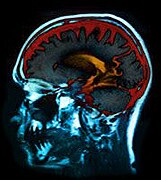Drug Given 24 Hours After Stroke Helps Repair Brain Tissue
Bryostatin may also work in patients with Alzheimer's and traumatic injury, study says.
|
E-mail this article
Subscribe to news
Printer friendly version
|

(SOURCE: Blanchette Rockefeller Neurosciences Institute, news release, Sept. 3, 2008)
WEDNESDAY, Sept. 3 (HealthDay News) -- A little-used cancer drug called bryostatin can repair brain tissue if it's administered within 24 hours after a stroke, according to U.S. researchers.
Current stroke treatments must be administered within three hours and aren't able to repair damaged brain tissue, the scientists said.
"Today's stroke patient has precious minutes to receive care without suffering irreversible damage or death. One of the greatest challenges in modern medical practice is finding an effective treatment that extends that treatment time and repairs damage. Bryostatin could be an answer," Dr. Daniel Alkon, scientific director at the Blanchette Rockefeller Neurosciences Institute, said in an institute news release.
In an article in the Sept. 3 issue of the Proceedings of the National Academy of Sciences, Alkon and colleague Professor Miao-Kun Sun describe how bryostatin -- which is being investigated as a treatment for Alzheimer's disease -- repairs the brain and improves memory.
More than 780,000 strokes occur each year in the United States. Stroke is the third leading cause of death in the United States and the leading cause of long-term disability in the developing world. Almost 75 percent of all strokes occur in people older than 65, and the risk of suffering a stroke more than doubles each decade after age 55, according to background information in the news release.
"We're facing an aging Baby Boomer population, an influx of 55-plus Americans, and treatment that is less time-restrictive and able to repair the brain if a stroke destroys tissue is urgently needed," Alkon said.
In animal tests, bryostatin rescued dying neurons, stimulated the growth of new neuron connections, and restored memory. The drug is effective when administered up to 24 hours after a stroke, according to the researchers.
The drug may also prove effective in preventing and/or reversing brain degeneration in patients with Alzheimer's disease and traumatic brain injury, Alkon said.
The researchers are in discussion with the U.S. Food and Drug Administration to begin clinical trials of the drug.
More information
The U.S. Food and Drug Administration has more about stroke prevention and treatment.
Copyright © 2008 ScoutNews, LLC. All rights reserved. 
HealthDayNews articles are derived from various sources and do not reflect federal policy. healthfinder.gov does not endorse opinions, products, or services that may appear in news stories. For more information on health topics in the news, visit the healthfinder.gov health library.